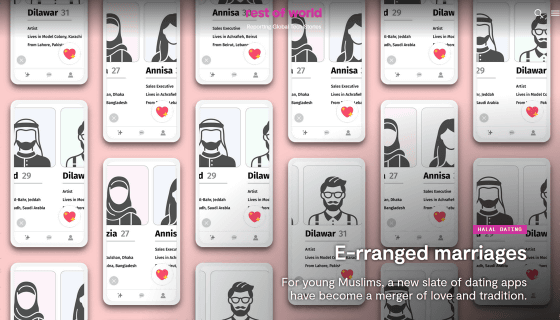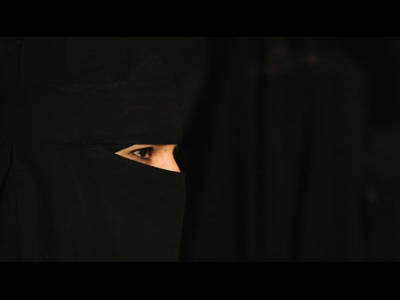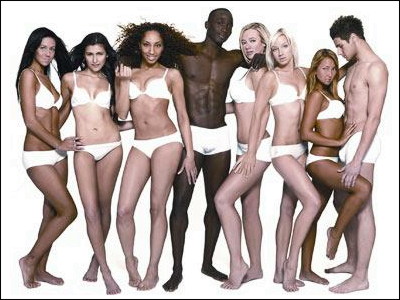What kind of matching app is accepted in the Islamic society where there are many matchmaking marriages?

In the Islamic culture, where conservative views of marriage are strong, traditionally, “matchmaking marriage” is mediated by family members and relatives, and men and women are limited in encounters. Even in such an Islamic society, the “matching app” for men and women has become popular in recent years, but unlike the casual app popular in Europe and America, the matching app that is popular in the Islamic society is unique in its traditional values. It is said to be a matching service.
Muslim matchmaking apps are disrupting tradition while still “keeping it halal.”-Rest of World

◆ 'Hawaya' that respects the values of Muslim women and reproduces 'matchmaking'
In the early 2010s, Shaymaa Ali, a woman living in Egypt, did not get married even in her late twenties. According to Egypt's traditional view of marriage, being unmarried in the late twenties was 'not so embarrassing' but 'pityful,' but Ali-san helped her family. I couldn't meet a good person in the matchmaking.
The Islamic community considers marriage a kind of contract, and Ali's parents wanted Ali to get married with a 'good man' who owned the car or apartment. However, Ali, who knew that the percentage of divorces within 5 years after marriage in Egypt is 40%, wanted Ali to have a marriage based on another aspect.
From around 2014, Ali began to announce her experience as a “single woman who did not get married” on Facebook, and eventually she gained over 50,000 followers. I saw Ali's complaint that 'why Egyptian men and women who seriously think about marriage can know each other before they actually meet each other' saw Egypt's dating app ' Hawaya '. It was the founder of Sameh Saleh.
Saleh noted that 72% of the more than 140 million smartphone users in the Middle East are under the age of 34, and many are struggling to find a marriage partner, assuming a marriage. I felt there was a demand for a matching app. On the other hand, in Egypt, casual matching apps based on Western values such as Tinder have a bad reputation, and they feel that there is a problem with how to attract conservative female users. Therefore, Mr. Saleh adopted Ali, who is a Muslim (Muslim), and developed a “matching app that matches the traditional values of Islamic society”.

The matching app Hawaya developed in this way has become a matching app with 1 million users in Egypt within three years of its release. In 2019 it was acquired by Match Group , which owns multiple matching apps such as Tinder and OkCupid, and has been re-released in 2019 in five languages: Arabic, German, Turkish, Indonesian and English.
In addition to basic questions about age, marital status, area of residence, etc., Hawaya requires profile images to be “classy and appropriate” for Muslims, and the minimum age is set to 21 years or older. I will. It also has an option that allows female users to hide their profile image and display the image when they allow their matching partner, and a function that allows the family to see the conversation with the matching partner together. It has been done. It seems that these functions respect the values of Muslim women and are intended to reproduce the traditional 'family-friendly matchmaking'.
For Muslims in a conservative society, new matching apps like Hawaya represent a new form of courtship. It is said that Egyptian Islamic society is accepting applications that can match the opposite sex in the range that could not be contacted by conventional methods while preserving traditional values.

◆ “Al Khataba” specializing in Muslims living in Saudi Arabia
The matching app called ' AlKhattaba ' developed by Lebanese entrepreneur Cedric Maalouf and others is a matching app for 'Muslims living in Saudi Arabia' only. Initially, Maalouf was developing a matching app targeting a wide range from the Middle East to North Africa, but cultural differences made it difficult to provide appropriate services. For example, previously, Maalouf said the service is ' water tobacco but had provided the questions of whether or not suck', because it had been a question that has a sexual connotation in some countries, have been removed.
Maalouf et al. switched to a policy of 'focusing on the country with the most traffic of matching apps', and decided to focus on Saudi Arabia in the Middle East, which once withdrew. It is thought that the demand for matching apps in Saudi Arabia is due to the rising divorce rate in recent years, and the desire to meet an ideal partner. AlKhattaba is offered in a form that only men are charged, and according to Maalouf, there are more than 300,000 monthly active users as of July 2020.
To address the unique issues of Saudi Arabia, Al Khattaba offers options for those who wish to have a Missha marriage where their wife and husband do not live together, and for men who want polygamy and women who allow it. In addition, even though they wanted to get married, there were many patterns in which marriage did not go well due to 'opposite of parents', so we adjusted the algorithm to incorporate the wishes of parents, and balance it according to the local culture. It seems that he is trying to do so.
To mitigate the concerns that authorities have with matching apps, AlKhattaba has a team around the clock that detects problematic conversations around the clock, as well as promptly withdrawing users who violate app quality rules. It is said that they are taking measures. In addition, AlKhattaba supports the relationship between men and women by sending advice to users who are unfamiliar with modern male and female interactions, such as 'Check the other person's profile before talking'.

◆ 'Muzmatch' that supports matching out of traditional values
Muzmatch, which has more than 3 million Muslim users in 190 countries including the United States and the United Kingdom, not in a specific region, also requires users to be “ halal- friendly ”. However, users who use Muzmatch do not have strict cultural values as the parent generation, and it is possible to match outside the conventional frame.
For example, when initially released, Muzmatch was set to match partners of the same ethnicity, but after collecting the data, it was discovered that users often clicked on profiles of people with different ethnic backgrounds. 'We decided to make some changes based on the idea that there is no caste or people in Islam, or at least not in Islam,' founder and CEO Shahzad Younas said. From a new section called 'Explore,' he said he was able to match people with different backgrounds.
Some people complain that matching apps make marriage feel like a deal, but in the first place, marriage in Islam was a sort of deal, Shahzad noted. Elderly members of the community are tired of finding their children's marriage partners, making matches, and following up on failures, arguing that the matching app frees people from these burdens.
Related Posts:
in Software, Smartphone, Posted by log1h_ik







